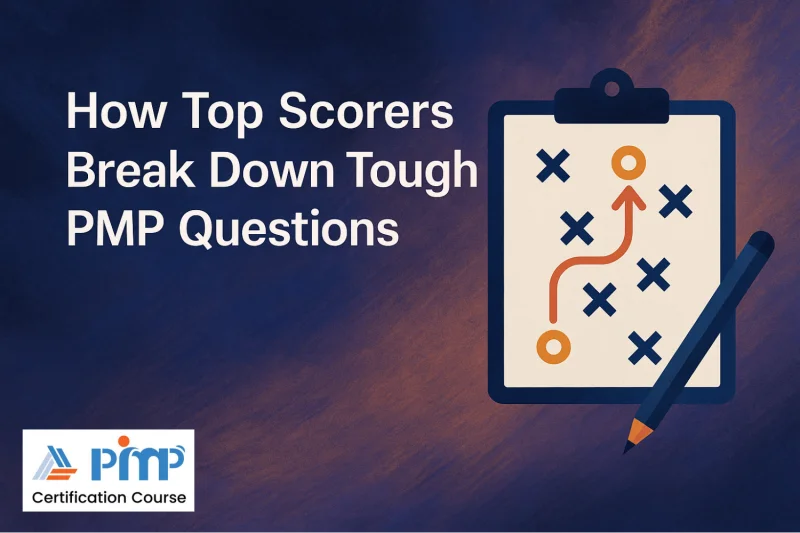How Top Scorers Break Down Tough PMP Questions

What’s the real reason some candidates walk out of the PMP exam room smiling while others look stunned, even though they studied just as hard? It often comes down to how they read the PMP Exam Questions, not just what they know. Earning your PMP Certification is no small feat, but getting there requires more than memorising processes.
Those complex, curveball PMP Exam Questions are designed to trip you up, unless you learn how to break them down the way top scorers do. Ready to find out what they’re doing differently? This might change the way you approach every single question. Let’s uncover the habits and thought processes that separate top scorers from the rest.
Table of Contents
- Strategies Top Scorers Use to Crack Challenging Questions
- Conclusion
Strategies Top Scorers Use to Crack Challenging Questions
Top scorers address every question with insight and technique. Here’s how they tackle even the most perplexing PMP questions and confidently select the suitable response:
Understand the Question Type
Top scorers first determine the type of question they are encountering. Is it seeking the first thing to do or the overall best answer? Is it testing analysis, knowledge, or judgment? This fast mental classification helps focus on the reading.
They rid the question of pointless background and reinterpret it in their own words. If a question states, “You are managing a project, and the client adds a new requirement following sign-off. What action should you take?” They turn it into: “Change request post-sign-off. What’s the next step?”
Visualise the Process or Scenario
This is where their understanding of PMP procedures is beneficial. Top scorers travel through the stages in their minds. They mentally go through the planning and control phases if it’s about risk management. If it’s a communication problem, they weigh stakeholder needs and escalation paths. This mental simulation lets them ground their responses in actual project flow.
Linking important terms to process groups and knowledge domains helps one focus on the correct zone for finding the solution. Top scorers map the events on a chronology. This approach helps remove choices that are not fit for the project’s level of development.
Eliminate with Precision
Top scorers find the incorrect answers first instead of looking for the right one. They cross out everything mentally. Even if they’re not sure, this helps their chances by lowering uncertainty. By working backwards, they often eliminate the wrong ones and make the right choice.
They ask: “Does this violate any project process or stakeholder rule?” If yes, it goes out. This technique helps when multiple options sound right, but only one fits the formal PMP structure.
Spot the PMP Logic in the Options
PMP exam answers generally mirror PMI’s perspective. Top scorers understand that this may not necessarily reflect what occurs in actual projects. They search for the response approved by PMI.
They remind themselves: “What would PMI want the project manager to do next?” It’s not about personal intuition; it’s about applying what’s taught in PMP training materials.
Manage Time Without Panic
Top scorers avoid having difficult questions ruin their timing. They answer each question in about one minute and fifteen seconds. If they find themselves caught, they mark it, make an informed assumption for now, and proceed.
This ensures they complete the paper and return to challenging questions later with a clear mind. They pace themselves in blocks. They ensure they’re not falling behind by checking progress every thirty questions.
Practice With Purpose
Improving your mock exam performance is more important than performing more of them. Top scorers go over every wrong response and probe why they missed it. Was that a misreading? A knowledge deficiency? A weak elimination plan? They also practice several questions by domain: risk, procurement, and scope, so they become familiar with the traps every area presents.
They compile a list of repeated mistakes over time. Maybe they keep misjudging stakeholder questions or overthinking cost control ones. Finding these trends helps them change their focus.
Conclusion
The PMP exam tests more than just memory. It challenges decision-making, process knowledge, and mental clarity. Top scorers don’t just study hard; they study smart. They read questions like a project manager would. A certification in project management offered by PMP Training can assist in your PMP preparation and help you approach the exam with greater confidence and skill.
Ti potrebbe interessare:
Segui guruhitech su:
- Google News: bit.ly/gurugooglenews
- Telegram: t.me/guruhitech
- X (Twitter): x.com/guruhitech1
- Bluesky: bsky.app/profile/guruhitech.bsky.social
- GETTR: gettr.com/user/guruhitech
- Rumble: rumble.com/user/guruhitech
- VKontakte: vk.com/guruhitech
- MeWe: mewe.com/i/guruhitech
- Skype: live:.cid.d4cf3836b772da8a
- WhatsApp: bit.ly/whatsappguruhitech
Esprimi il tuo parere!
Ti è stato utile questo articolo? Lascia un commento nell’apposita sezione che trovi più in basso e se ti va, iscriviti alla newsletter.
Per qualsiasi domanda, informazione o assistenza nel mondo della tecnologia, puoi inviare una email all’indirizzo [email protected].
Scopri di più da GuruHiTech
Abbonati per ricevere gli ultimi articoli inviati alla tua e-mail.
